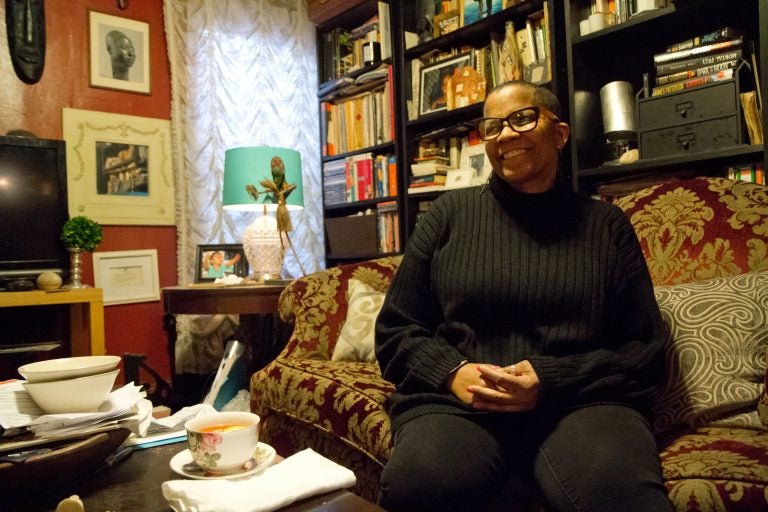After years of domestic violence, a gun changed everything
Renee Norris Jones was in an abusive relationship for seven years.
Listen 7:48
Domestic Violence survivor Renee Norris Jones at her home in Nicetown. Norris Jones said that despite enduring years of abuse, nothing gave her more fear than when she was confronted with a gun. (Kimberly Paynter/WHYY)
A woman in an abusive relationship can be as much as five times more likely to die when her abuser owns a gun, according to research published in the American Journal of Public Health.
Renee Norris Jones was in an abusive relationship for seven years. But when her husband brought home a gun, everything changed.
She met Carlton Warren Jones at a Philadelphia bus stop in 1974. She was 16 years old, with a toddler. He was good-looking, and she was charmed by him. They started dating and when she was 18, they married.
Norris Jones says it was two years into the relationship before Carlton became violent. He would beat her regularly, often until she was unconscious. Sometimes she’d call the police but she says it was common for them not to show up. When help did arrive, the officers weren’t much help, she says.
One time in 1976, Norris Jones had just filed for a restraining order, which were brand new at the time. When Carlton came home, she called the police because he was in violation of the order. When the police arrived, Norris Jones says her husband began to beat her, right there in front of the police.
The officer did nothing, she says.
“I’m watching this police officer and he is cleaning his nails going, ‘Mr. Jones, please take your hands off of your wife,’” she said.
The officer waited for Carlton to tire out, walked him to the corner and back so he’d cool down, and then bid them both a goodnight without acknowledging her, or her restraining order, Norris Jones says.
Sometimes, after Carlton would beat her, Norris Jones would go stay in a women’s shelter. But those facilities were often full, and when there was room, women were only allowed to stay for a week.
Within days, she would go home, where Carlton would inevitably hit her again. Her finances were wrapped up with his. She depended on him. Carlton was also abusing her children, Norris Jones says, and she was afraid for their safety.
After one beating, Norris Jones went to her father’s house and shared what she was going through.
“He looked at me and said, ‘What did you think marriage was?’” Norris Jones said. “So that totally screwed me up. I used to think that I was a fool for all the times I left.”
One night, everything changed.
“We went to bed,” she said, “and just as we were going to sleep he pulled out a gun, pointed it to my temple, put his finger to the trigger and then put a pillow on it and lay down and said, ‘This is so you don’t go anywhere in the middle of the night — I’m tired of you leaving me.’”
Norris Jones had been planning to leave again — she’d found a roommate and they’d rented an apartment across town. She was waiting for the right moment to move on.
“It was seven years of hell, but the magnitude of all of those years together and the gun were equal,” she said. “And it just sent me to a different place.”
Norris Jones called her roommate and together they packed her things. She realized she had to take the gun; otherwise, Carlton might come looking for her — and use the gun.
She and her roommate picked up the gun as if it were a delicate egg, or a live animal. They carried it to the moving truck, and across town they carefully placed it on the floor of the linen closet in the new apartment.
The gun stayed there for a year and a half. During that time, Carlton never found Norris Jones.
Later, once she’d regained her footing, Norris Jones wanted a divorce. And that meant she had to get in touch with Carlton again. She tracked him down, and asked if he’d sign the divorce papers.
“And he said, ‘Sure, if you give me my gun back,’” she remembered.
Norris Jones didn’t like the plan, but she was willing to do whatever it took to get his signature. So she pulled the gun out of its hiding place and disassembled it. She took every piece, down to the individual bullets, and wrapped them up in newspaper and tape. She stuffed all the bulky, wrapped gun parts into shopping bags, and set out for the restaurant.
She’d picked a fancy place, with lots of wait staff.
“If I so much as dropped a fork I wanted 15 waiters to come running,” she said.
Norris Jones got there first and ate a nice lunch. Carlton arrived, and asked if she’d brought the gun. She motioned to the shopping bags. Carlton signed the divorce papers and Norris Jones got up to leave. As she glimpsed over her shoulder, she heard Carlton mutter something like, “What did you think I was going to do?”
Norris Joes says she didn’t stop to answer. She kept walking, turned the corner and was gone.
In 1984, she got a phone call from a friend who told her that Carlton’s mother had been found murdered, by her son.
“My first thought was, ‘Oh my God, that could’ve been me,’” she said.
Carlton Warren Jones was convicted of first-degree murder. He died in prison in 2015.
Norris Jones is doing well. She’s still in therapy, is an advocate for women in abusive relationships, and tells her story to people around the country. She recently completed a Ph.D. program, and is now Dr. Norris Jones.
WHYY is your source for fact-based, in-depth journalism and information. As a nonprofit organization, we rely on financial support from readers like you. Please give today.







